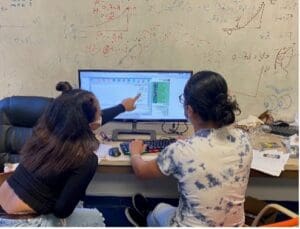U.S. Department of Education’s Minority Science and Engineering Improvement Program (MSEIP) Awards Fisk University’s STEM through Rocketry Electronics Engagement and Coding (STEM-TREEC) Program
Fisk University announces yet another accolade helping to fulfill President Newkirk’s vision of becoming the No. 1 ranked HBCU in the nation. Fisk is proud to announce Dr. Bryan Kent Wallace, Assistant Professor of Physics has been awarded a $750,000 over three-year Institutional Grant from the U.S. Department of Education’s Minority and Engineering Improvement Program (MSEIP). The Fisk program called, STEM-through Rocketry, Electronics, Engagement, and Coding (STEM-TREEC) is designed to increase retention of STEM students of color and women in Physics, Mathematics, Chemistry, and Computer Science and entice them to pursue careers in the various fields of Engineering.
the No. 1 ranked HBCU in the nation. Fisk is proud to announce Dr. Bryan Kent Wallace, Assistant Professor of Physics has been awarded a $750,000 over three-year Institutional Grant from the U.S. Department of Education’s Minority and Engineering Improvement Program (MSEIP). The Fisk program called, STEM-through Rocketry, Electronics, Engagement, and Coding (STEM-TREEC) is designed to increase retention of STEM students of color and women in Physics, Mathematics, Chemistry, and Computer Science and entice them to pursue careers in the various fields of Engineering.
This program will be led by:
- Bryan Kent Wallace – Principle Investigator (P.I.)
- Sajid Hussain – Senior Faculty
- Akira Ueda – Program Coordinator
“Receiving the award for the STEM through Rocketry, Electronics, Engagement, and Coding (STEM-TREEC) grant is a huge opportunity for Fisk University, MSEIP is a highly competitive grant sponsored by the Department of Education authorized by Title III Part E,” said Dr. Bryan Kent Wallace. “This will provide significant resources to Fisk to positively impacts student’s sense of scientific identity which research suggests is a strong factor in students having persistence to complete their degrees and go on to STEM related post undergraduate endeavors.”
These goals will be achieved by the development of one 100 level and one upper-level applied science research course which will expose undecided STEM students and dedicated upper-level STEM students respectively to research projects in rocketry, arial drones, terrestrial rovers, and high-altitude weather balloons (balloon sats). This strategy of retention was inspired by research that found a strong correlation of retention by students who engaged in STEM related research vs. students who did not engage in any formal research.
The program will also provide the largest infusion of resources into the introductory physics courses in over 20 years. This will have a high value impact on Fisk STEM students since all science students have Physics as part of their required courses. Certain introductory physics courses will utilize experiential physics and other best practice strategies to enhance student achievement and thus increase STEM student retention.
The program will develop a Maker Space for student use in the Introductory Physics Laboratory during the evening hours. This will give students an opportunity to design, and 3D print various projects. This maker space is meant to enhance student achievement though engagement in informal learning environment activities.
Lastly, one of the long-term goals of the program is for the students to design, build, and launch an either liquid propellant or hybrid motor rocket in sub orbital flight. If successful, Fisk University would be the first Historically Black College & Universities (HBCU) to directly launch an object into outer space.